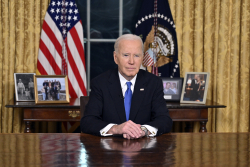Donald Trump proposes renaming May 8 and November 11 as “Victory Days” for World Wars I and II, sparking debate over historical accuracy, veterans’ recognition, and holiday authority limitations.
President Donald Trump campaigned to reshape the federal government and fundamentally recreate the United States. That has included efforts to rename a federal holiday and create another, declaring that the country should “start celebrating our victories again!“
In a post on his Truth Social platform late Thursday, the president wrote, “Many of our allies and friends are celebrating May 8 as Victory Day, but we did more than any other Country, by far, in producing a victorious result on World War II. I am hereby renaming May 8 as Victory Day for World War II and November 11 as Victory Day for World War I.“
He went on to add, “We won both Wars. Nobody was close to us regarding strength, bravery, or military brilliance. Still, we never celebrated anything because we no longer have leaders who know how to do so! We are going to start celebrating our victories again!”
Trump Can’t Create a “Victory Day” Holiday
Since returning to the White House in January, Trump has issued a wave of executive orders, but it is unclear what his “renaming” of the two dates means. While he can rename any day, it doesn’t mean it will be an official holiday.
As The Hill reported, “Federal holidays are created through acts of Congress. In 2021, Congress voted to establish Juneteenth as a federal holiday, and former President Biden signed the bill into law.”
Then there is the issue that November 11 is already a federal holiday, Veterans Day. Initially, it was meant to honor those who served in the First World War, but it later expanded to honor all veterans.
How it became an official holiday is more complicated.
The History of These “Victory Days:” Armistice Day to Veterans Day
President Woodrow Wilson had proclaimed the first commemoration of “Armistice Day” just a year after the guns fell silent in Europe. This is important because the fighting may have ended on November 11, 1918, but the Treaty of Versailles wasn’t concluded until June.
Moreover, the U.S. Congress didn’t officially recognize the end of what is now known as World War I until the passing of a resolution on June 4, 1926.
There is also the fact of what Trump may expect from the holiday.
In Wilson’s view, “To us in America, the reflections of Armistice Day will be filled with solemn pride in the heroism of those who died in the country’s service and with gratitude for the victory, both because of the thing from which it has freed us and because of the opportunity it has given America to show her sympathy with peace and justice in the councils of the nations.”
Armistice Day became a “legal holiday” in 1938 to honor the First World War veterans. Congress modified the holiday’s name in 1954 to honor those who fought in the Second World War, making it “Veterans Day.”
If the holiday is renamed again, will it still honor veterans?
Veterans Day vs. Memorial Day vs. “Victory Day”
Some might argue that there is already another day that honors those in uniform—namely, “Memorial Day.” However, as previously reported, Memorial Day is actually a more solemn occasion—or at least should be—as it honors those men and women who died while serving in the Armed Forces. It is a time to reflect and remember those American patriots who made the ultimate sacrifice while protecting and defending the country they loved.
That holiday’s origins go back to May 1868, when General John A. Logan, who was the commander-in-chief of the Union veterans’ group the Grand Army of the Republic, issued a decree that May 30 should become a nationwide day of commemoration for the more than 620,000 soldiers killed in the recently ended Civil War. Logan reportedly chose that date for Decoration Day not because it marked a significant battle, but rather because it was a rare day that didn’t fall on the anniversary of a Civil War battle.
Logan, who had been a congressman before the war, returned to his political career and eventually served in both the House and Senate. When he died, his body was laid in state in the rotunda of the United States Capitol, making him just one of thirty-four people to have received the honor.
The nation embraced his Decoration Day, and by 1890, every state adopted it as a holiday. Over the years, it was used to remember those killed not just in the Civil War but in other American conflicts. However, it wasn’t until 1971, during the Vietnam War, that Memorial Day became officially recognized as a national holiday.
Trump’s “ Victory Day” Is Inaccurate
As noted, Trump had also called for renaming May 8th to “Victory Day for World War II.” However, historians and history buffs have pointed out that May 8, 1945—or VE Day as it became known—only marked Victory in Europe.
The fighting in the Pacific continued until August 15, after the United States dropped the atomic bombs on Hiroshima and Nagasaki, resulting in Japan’s surrender. It is believed that nearly 70,000 U.S. military personnel were killed between May 8 and August 15, with more than 100,000 wounded.
Thus, World War II was far from over!
However, it is possible that Trump took a cue from Europe, where celebrations regularly occur on May 8. It is also true that Russia celebrates May 8 by holding the famed “Victory Day Parade” in Moscow, while smaller parades are held around the country to mark its victory over the Nazis.
In recent years, those events have been scaled back to almost laughable levels, such as including only a single T-34 at the most recent parades in Moscow.
In addition, May already has numerous holidays, including May Day, Mother’s Day, and the aforementioned Memorial Day. Likewise, there is “May the Fourth,” which is the “Official” Star Wars day, while Cinco de Mayo is the unofficial day for Americans to go get Mexican food. It is a truly mass market holiday created by beer and liquor companies, and according to The New York Times, it generates as much in beer sales as the Super Bowl! Yet, for the record, May 5 isn’t the same as Mexican Independence Day.
Instead, it celebrates Mexico’s victory over the Second French Empire at the Battle of Puebla in 1862.
To conclude, the Greatest Generation deserves more recognition, especially as the media might go all out marking May the Fourth but often fails to note the anniversary of the end of World War II in Europe. But let’s pick the right day, and who wouldn’t mind another summer holiday in the middle of August?
About the Author: Peter Suciu
Peter Suciu has contributed over 3,200 published pieces to more than four dozen magazines and websites over a thirty-year career in journalism. He regularly writes about military hardware, firearms history, cybersecurity, politics, and international affairs. Peter is also a Contributing Writer for Forbes and Clearance Jobs. He is based in Michigan. You can follow him on Twitter: @PeterSuciu. You can email the author: [email protected].
Image Credit: Shutterstock/ Joey Sussman.
















